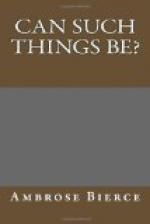In following out his thought he had forgotten that which suggested it; but now his eye fell again upon the corpse. The shadow had now altogether uncovered it. He saw the sharp profile, the chin in the air, the whole face, ghastly white in the moonlight. The clothing was gray, the uniform of a Confederate soldier. The coat and waistcoat, unbuttoned, had fallen away on each side, exposing the white shirt. The chest seemed unnaturally prominent, but the abdomen had sunk in, leaving a sharp projection at the line of the lower ribs. The arms were extended, the left knee was thrust upward. The whole posture impressed Byring as having been studied with a view to the horrible.
“Bah!” he exclaimed; “he was an actor—he knows how to be dead.”
He drew away his eyes, directing them resolutely along one of the roads leading to the front, and resumed his philosophizing where he had left off.
“It may be that our Central Asian ancestors had not the custom of burial. In that case it is easy to understand their fear of the dead, who really were a menace and an evil. They bred pestilences. Children were taught to avoid the places where they lay, and to run away if by inadvertence they came near a corpse. I think, indeed, I’d better go away from this chap.”
He half rose to do so, then remembered that he had told his men in front and the officer in the rear who was to relieve him that he could at any time be found at that spot. It was a matter of pride, too. If he abandoned his post he feared they would think he feared the corpse. He was no coward and he was unwilling to incur anybody’s ridicule. So he again seated himself, and to prove his courage looked boldly at the body. The right arm—the one farthest from him--was now in shadow. He could barely see the hand which, he had before observed, lay at the root of a clump of laurel. There had been no change, a fact which gave him a certain comfort, he could not have said why. He did not at once remove his eyes; that which we do not wish to see has a strange fascination, sometimes irresistible. Of the woman who covers her eyes with her hands and looks between the fingers let it be said that the wits have dealt with her not altogether justly.




